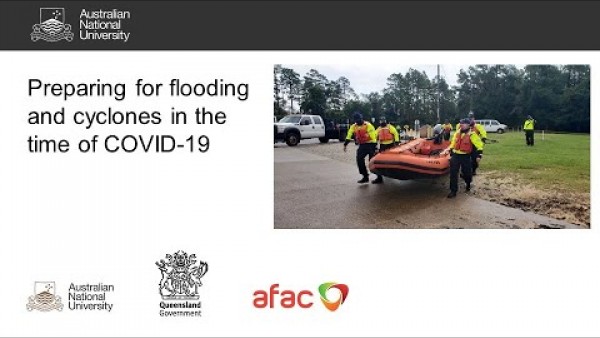Preparing for flooding & cyclones in the time of COVID-19
Australia is now on ‘La Niña watch’ status, meaning there is an increased likelihood of flooding and cyclones in the upcoming regular cyclone season. The continuing impacts of climate change also means these weather events may be more intense than in past years.
This year, COVID-19 restrictions are also an additional factor that will impact on flood and cyclone preparedness, response and recovery.
In this event, we heard from climate scientists and emergency services practitioners about the prospects of a La Niña season with increased flood risk, along with the practical difficulties COVID-19 imposes on emergency service, other agencies, and communities.
The presentations were followed by breakout room sessions, for discussion and consultation with the audience on either operations or communications and community engagement.
Presentation slides -
Dr Steven Crimp: Rainfall Outlook for 2020/21
Rosemary Hegner: Capability, ERM and COVID
Jo Killick: Recovery - A Queensland Experience
Event programme
9:30am - Event begins. Acknowledgement of country, introduction of the event and individual speakers.
9:35am - Short opening statements and presentations from all speakers.
10am - Question and Answer session with the audience.
10:15am - Those who have registered to do so will be allocated into breakout rooms for discussion and consultation.
10:35am - Everyone rejoins for feedback summaries from the breakout room discussions.
10:55am - Closing statements and overview of what will follow.
11am - Event concludes.
Moderator
Georgeina Whelan - ACT Emergency Services Agency Commissioner
Speakers (in alphabetical order)
Daniel Austin - Deputy Commissioner, Operations, NSW State Emergency Services
Jo Killick - General Manager, Queensland Reconstruction Authority
Rosemary Hegner - Director, Capability and Planning, Resilience NSW
Dr Steven Crimp - Climate Applications Scientist, The Australian National University
Image credit: Coast Guard News / Flickr
This event has been organised by the Climate Change Institute and the Disaster Risk Science Institute at The Australian National University, and is co-hosted with AFAC, the National Council for Fire and Emergency Services.










